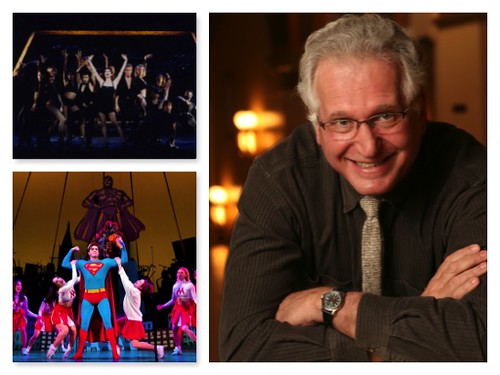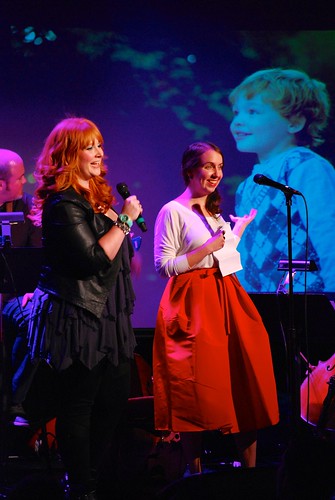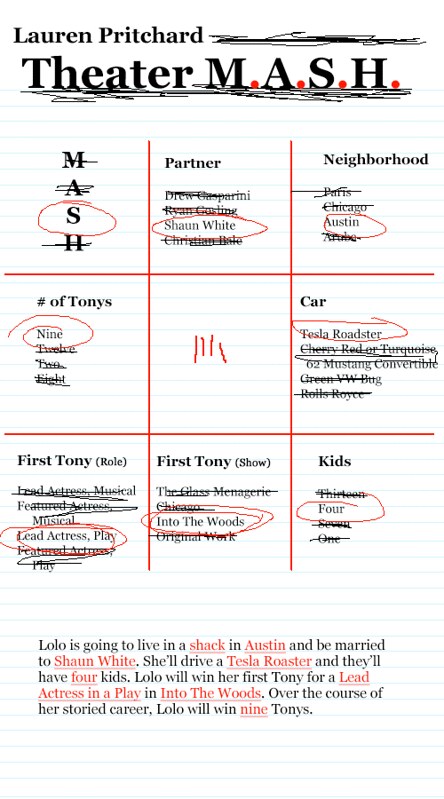
Love Broadway musicals but hate having to sit through all that talking between the songs? You’re in luck. In the next couple of months, you can catch the New York Philharmonic doing Sweeney Todd in Concert, Lincoln Center hosting Titanic in Concert, Carnegie Hall offering Guys and Dolls in Concert, and 54 Below with concert revivals of Smokey Joe’s Cafe and Side Show on deck. But most importantly, the 21st season of Encores! Great American Musicals in Concert kicks off with Little Me the first week of February. Believe it or not, once upon a time, concert productions of older shows didn’t fill our concert halls and nightclubs. There was the occasional Kern or Gershwin show dusted off at Carnegie Hall or the Library of Congress, and starry casts came together for special events like Follies in Concert, but they were just that—special events.
When the curtain rose on Encores! in 1994, with a season featuring Fiorello! (a Pulitzer Prize-winning show by the team who wrote Fiddler on the Roof), Allegro (the Rodgers & Hammerstein flop that inspired Stephen Sondheim to become Stephen Sondheim), and Lady in the Dark (the Kurt Weill/Moss Hart musical drama of psychoanalysis that produced two standards, “My Ship” and “The Saga of Jenny,”) Broadway musicals in concert moved from “special event” to annual traditions. Although Encores! has inspired many imitators, it remains in a class by itself. The Encores! shows have become an annual tradition for many theatergoers. In fact, before I moved to New York, I was already an Encores! subscriber, and it was at a brunch with fellow fans before one of those shows that I first met Lucky and The Mick, cementing my love affair with The Craptacular. Indeed, my first appearance on this site was to gush about Will Chase dancing with his dream doppelganger in the Encores! production of Pipe Dream. But I digress.
The history of Encores! is tied up with the history of City Center itself. Originally built as a home for The Shriners, the property fell into the hands of the city during the Great Depression and became a home to the performing arts in 1940. In its first two decades as an arts venue, City Center offered dance, opera, and revivals of popular musical theater pieces in equal measure. (Florence Henderson in South Pacific! Bob Fosse in Pal Joey!) When Lincoln Center came on the scene in the 1960s, City Center lost its resident opera and ballet companies. With the success of No, No, Nanette on Broadway in the 1970s, musical comedy revivals largely moved to the for-profit world of Broadway. While dance companies continued to use the main stage, and the Manhattan Theatre Club moved into the property’s former basement banquet hall in the 1980s, big musicals were no longer part of the center, and City Center was no longer producing its own shows.
This changed under the leadership of Judith Daykin, who led City Center in the 1990s and dreamed up the Encores! series with Ted Chapin, head of the Rodgers & Hammerstein Organization, and several friends and collaborators. I had the opportunity to chat with Jack Viertel, Encores! artistic director since 2001, about the history of the series and where it’s headed. Thinking back to those early years, he said, “It took up three weekends of the life of the institution [each year], and over the years it has grown. But my not so secret agenda is for it to grow even more. I would be happy if the building was split 50/50 between dance and musical theater.”
Viertel has overseen quite a bit of that growth, partnering with Jazz at Lincoln Center on biennial fall shows blending jazz and showtunes such as this year’s Wynton Marsalis/Stephen Sondheim collaboration A Bed and A Chair and 2011’s Cotton Club Parade (which became the current Broadway hit After Midnight) and inaugurating Encores! Off-Center, the summer series of off-Broadway musicals in concert that debuted this past summer under the artistic direction of Jeanine Tesori.
Many of the signature elements of Encores! were in place from those first shows: a cast of Broadway talent (no interlopers from the world of opera, pop, film, or tv), orchestra on stage outlined by a distinctive gold frame, full original orchestrations, and visible scripts in the hands of the performers. That first year, performances were introduced by celebrity presenters like Christopher Reeve (pre-paralysis) and Stephen Sondheim (post-deification), and when the shows required dancing, the cast took seats to focus attention on the orchestra, whose playing was accompanied by slides of the original productions.
Over time, Encores! has evolved, with the productions becoming more elaborate, the scripts becoming less visible, and the range of shows included becoming broader. (And, thanks to the 2010-2011 renovation of City Center, the sight lines have gotten better too.) As Viertel said to me, “There isn’t really a mission statement for Encores! It was originally called ‘Great American Musicals in Concert,’ which has a number of key words: American, Great, and Concert.” He noted that over time, they’ve violated all three of those dictates, performing shows that weren’t great “but have great things about them,” moving from concert presentations to something that’s not quite a full production, but more to that side of the spectrum, and with this year’s inclusion of Irma La Douce, offering a show that began overseas, although Encores! will present the Broadway version.
“It’s an evolving mission,” Viertel said, “but it’s about hearing scores again, and hearing them in the ‘whole-est’ possible way. That means original orchestrations, ideally, or if they’re not available, colorful orchestrations in the character of the originals, discovering the scores are great as they are. It’s largely about the music.”
It’s this philosophy that justifies popular favorites like Hair and Bye Bye Birdie alongside obscurities like Sweet Adeline and The New Moon. Although Hair and Birdie get produced all the time—and both have returned to Broadway since their Encores! bows—only the Encores! productions presented the scores with the original orchestrations, as they were heard on their opening nights on Broadway.
Give the possibilities such a broad mandate opens up, Viertel has developed a bit of a formula to guide the building of each season, although he admits the criteria are loose. Each season attempts to offer three shows that are unlike each other, mixing older and newer shows, comedies and dramas, art pieces with entertaining ephemera. (You can certainly see that at play this year, which features a brassy Broadway comedy, a gigantic near-operatic drama, and a jazzy dance-filled chamber piece.) Beyond that? “There are two absolute requirements: one is that the rights are available and we have acquired them, which is not always true (they’re not always available), and we understand how we’re going to achieve the music,” said Viertel. “That could be as simple as taking it out of the box and putting it on the music stands, or it may require reorchestrating entirely, and we need to know in advance what those requirements are. We couldn’t, for example, reorchestrate two shows in one season, we don’t have the labor or the money.”
Despite the number of shows historically written around the talents of a specific star, casting in Encores! productions usually happens after the season is announced, with a couple of notable exceptions. “There have been shows, like The Apple Tree or Can-Can, where we’ve said if Kristin Chenoweth will do Apple Tree, we’ll do Apple Tree, but if not we’ll do some other show,” said Viertel. “In the case of [this season’s] Irma La Douce specifically, [the title role] is sort of uncastable with a star. It’s a huge dance role. Elizabeth Seal, who did it originally, was the Gwen Verdon of England, and there is no such star any more. Even though it’s a big challenge, we were comfortable announcing and going with the best we can find. We wouldn’t have done that with Can-Can. We did Can-Can because of Patti LuPone.”
So what does the future of Encores! hold? Viertel is ambitious: “I think one of the things we’re very committed to is restoring more lost scores—I mean shows where there are no orchestrations that can be played. Part of that is pragmatic because we’ve now done almost 70 of these things, and we get into the ones where there’s reason we haven’t done them—there’s no music to put on music stands. We’re specifically raising money for restoration.
“I don’t know beyond that what specifically we’ll do. It’s interesting as you go through this process, and I’ve been doing it for 12 years: you think you’ve hit the end of something and you’ve actually just turned a corner, and there’s stuff you haven’t even imagined before.”
This year’s Encores! season kicks off in just a few weeks with the Cy Coleman/Carolyn Leigh/Neil Simon musical comedy Little Me, February 5 – 9, starring Christian Borle, Rachel York, and Judy Kaye. Learn more about Little Me in two weeks in the next installment of Remedial Queens.






